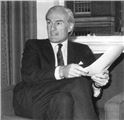BLMC workers warned that only improved efficiency can save jobs
11 January 1975
By Clifford Webb
Mr John Barber, managing director of British Leyland, yesterday warned 415 delegates representing the corporation's 165,000 United Kingdom workers that only improved efficiency by managers and shop floor workers alike could save their jobs in the crisis facing the motor industry.
He said: "If we can step up production performance and general efficiency and be prepared to use short time working rather than major redundancies, should market conditions deteriorate further, then we can minimize the impact of the economic recession."
"But there can be no hope of security of employment with out greater efficiency. In fact the economic crisis is so severe that no guarantees of any kind are possible."
"This applies whether we have government money or not. Nobody is going to subsidize inefficiency". He said surplus production capacity in Europe amounted to several million cars and that meant really tough competition. "We shall have to fight to increase our market shares."
The "alarming losses" caused by inefficiency were spelt out by Mr Alex Park (left), director of finance. He told the delegates gathered at the Longbridge, Birmingham, headquarters of the Austin-Morris division, that 3 per cent of scheduled production was lost in October and November, 7 per cent through quality defects, 4 per cent through facility failures; 5 per cent through programme changes, 2 per cent through absenteeism, 4 per cent through external labour disputes and 15 per cent through internal labour disputes.
He said responsibility for these shortcomings was divided equally between management and workers. Mr Park said figures to date for the 1975 financial year showed a worrying continuation of the 1974 performance
"Sir Don Ryder's review team and the Government will be forced to base any decision on the cold hard facts of commercial credibility ", he continues. "The Government has agreed to guarantee our overdraft facilities for six months, no more."
"We are expected to provide a positive cash flow situation in that time and to convince people we are a viable operation. " Six months is a hell of a short period and the figures show that our worst enemy could be complacency."
Mr Barber told delegates who complained of the group's out of date machinery and " clapped out plants " that no less than 48 per cent of the £500m investment planned for the next few years would go on modernization of existing factories.
Mr Dick Etheridge, joint chairman of the British Leyland unofficial combined shop stewards committee said it was clear from the meeting that the motor industry was in for one of the worst periods in its long history. "As far as I am concerned they are not sacking anybody in this factory without bloody trouble. I believe we are in for a really traumatic time."
More news from the archive
Compare classic car insurance quotes and buy online. A friendly service offering access to a range of policies and benefits.






